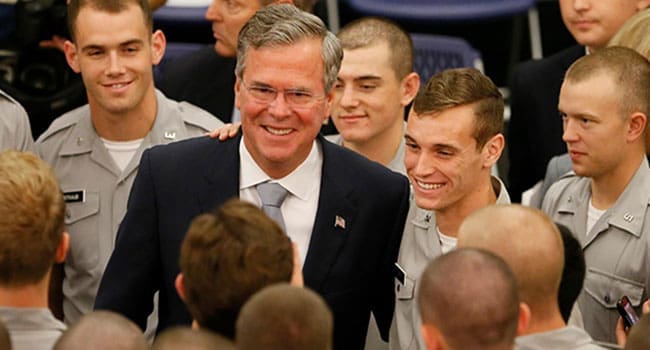 When Jeb Bush muscled Mitt Romney out of the 2016 Republican presidential race, he was widely perceived as the clear front-runner. Indeed, many pundits saw him as inevitable, and began speculating about a general election Bush-Clinton rerun.
When Jeb Bush muscled Mitt Romney out of the 2016 Republican presidential race, he was widely perceived as the clear front-runner. Indeed, many pundits saw him as inevitable, and began speculating about a general election Bush-Clinton rerun.
Bush appeared to have everything a successful candidate requires. There was oodles of money, family connections, broad support from the Republican establishment, and a personal history that included two successful terms as governor of Florida.
Somehow, though, it appears to have all gone awry. As of early January, the Bush campaign is in deep trouble.
Nationally, he’s polling sixth, and the situation isn’t materially better in the key early contests for Iowa, New Hampshire and South Carolina. Even in his home base of Florida, he’s currently running fourth!
Mind you, this kind of come-uppance has an ancient pedigree. Stretching back as far as the 1960s, you’ll find situations where the conventional wisdom’s candidate, the guy who seemed to tick all the right boxes, ran into fatal trouble once the actual competition got under way.
In the 1968 presidential cycle, that guy was George Romney – Mitt’s father. Born into modest circumstances, Romney had scaled the heights of the American automobile industry before being elected Republican governor of Michigan in 1962. In office, he compiled the kind of activist, big spending record that was then fashionable. And it was also popular with the majority of his constituents, who re-elected him in 1964 and 1966.
Clearly, Romney was the kind of candidate who might successfully compete with the Democrats at the presidential level – or at least that was the conventional wisdom. After all, the alternative, Richard Nixon, was a shop-worn loser who would surely be doomed to defeat in a general election.
Initially, this scenario seemed credible. Gallup’s November 1966 numbers had Romney eight points ahead of Nixon, with subsequent polling showing him consistently in second-place and within plausible striking distance. Then, courtesy of an off-hand remark blaming “brainwashing” for his previous support of Lyndon Johnson’s Vietnam policy, Romney’s position rapidly disintegrated. And facing annihilation in the New Hampshire primary, he folded his campaign two weeks before the vote.
Something similar happened in the Democratic race four years later.
The inevitable guy then was Senator Edmund Muskie, who’d been vaulted into the top tier by his creditable performance as Hubert Humphrey’s running-mate in 1968, and was subsequently anointed front-runner when Teddy Kennedy self-destructed at Chappaquiddick. With cautious centrism as his watchword, Muskie had accumulated broad establishment support and a formidable polling lead. Indeed, he was even competitive with the incumbent president, Nixon, in prospective general election match-ups.
However, when the actual campaign heated-up, Muskie’s support turned to mush. It was, as one commentator put it, “a mile wide and an inch deep.” Badly wounded – albeit nominally victorious – in the March New Hampshire primary, the Muskie campaign went into dissolution mode. By the end of April, he was formally out of the race.
As presidential candidates, Romney and Muskie had a couple of things in common.
If we define respectability as ideological congruence with the opinions of the mainstream “quality” media, both men were eminently respectable. In fact, their centrist conformity was such that you could easily re-imagine Romney as a Midwestern Democrat and Muskie as a New England Republican.
And while their political personas were effective in their native terrains, neither man’s style travelled particularly well when forced to compete on a broader canvas. Outside of their natural comfort zones, they were a long way short of heavy hitter status.
Although 2016 isn’t 1968-72, Jeb Bush exhibits some similar traits.
Like Romney and Muskie, he’s the establishment’s idea of a safe, respectable candidate, in both electoral and ideological terms. And also like them, when the going gets rough his political skills turn out to be surprisingly clunky.
Of all his underwhelming moments in the debates so far, perhaps the most eye-opening was the ill-advised attack on competitor Marco Rubio’s Senate attendance record. Not only was the attack patently contrived, but when Rubio – the younger man and erstwhile protégé – dismissively batted it away, Bush was clueless for a rejoinder.
Barring a major turnaround, Jeb may be about to provide a textbook example of how money and connections don’t necessarily get the job done. History, it would seem, likes to repeat itself.
Pat Murphy casts a history buff’s eye at the goings-on in our world. Never cynical – well perhaps a little bit.
The views, opinions and positions expressed by columnists and contributors are the author’s alone. They do not inherently or expressly reflect the views, opinions and/or positions of our publication.


